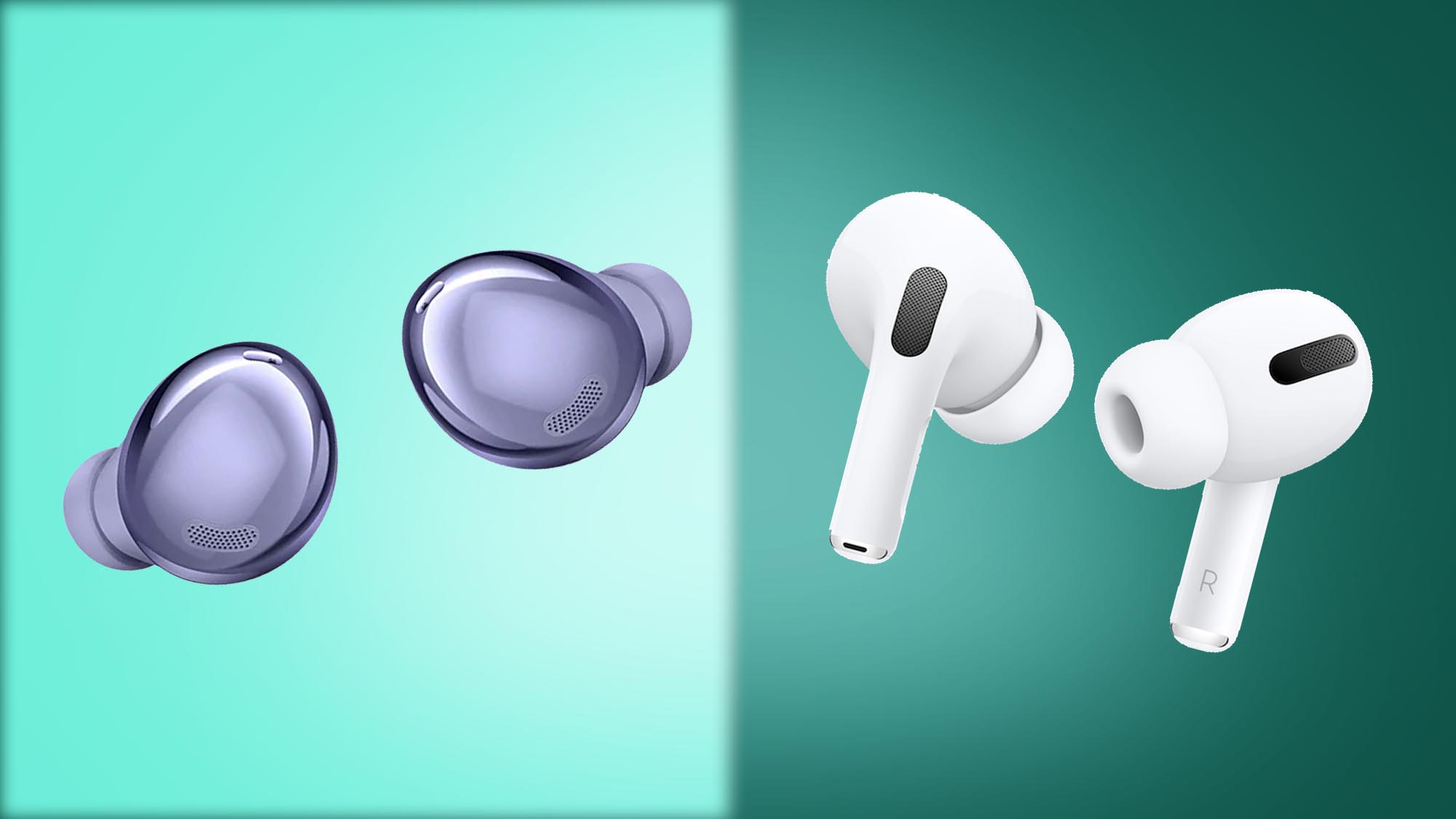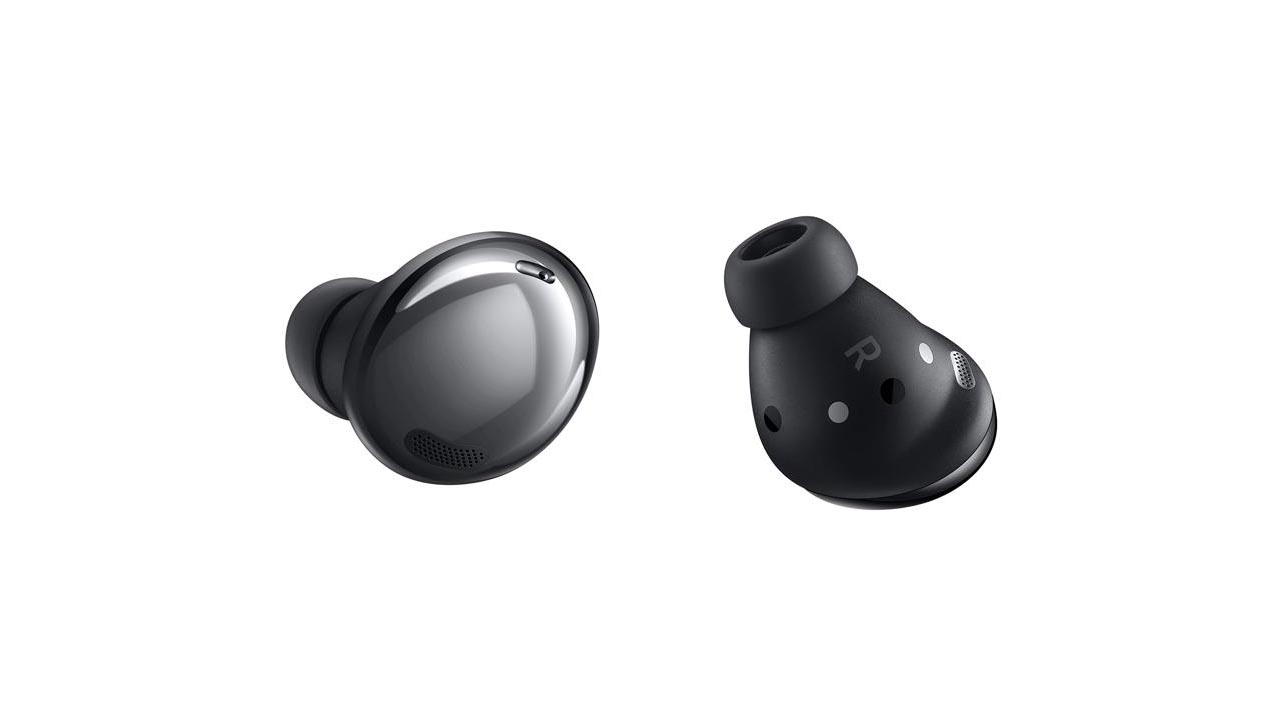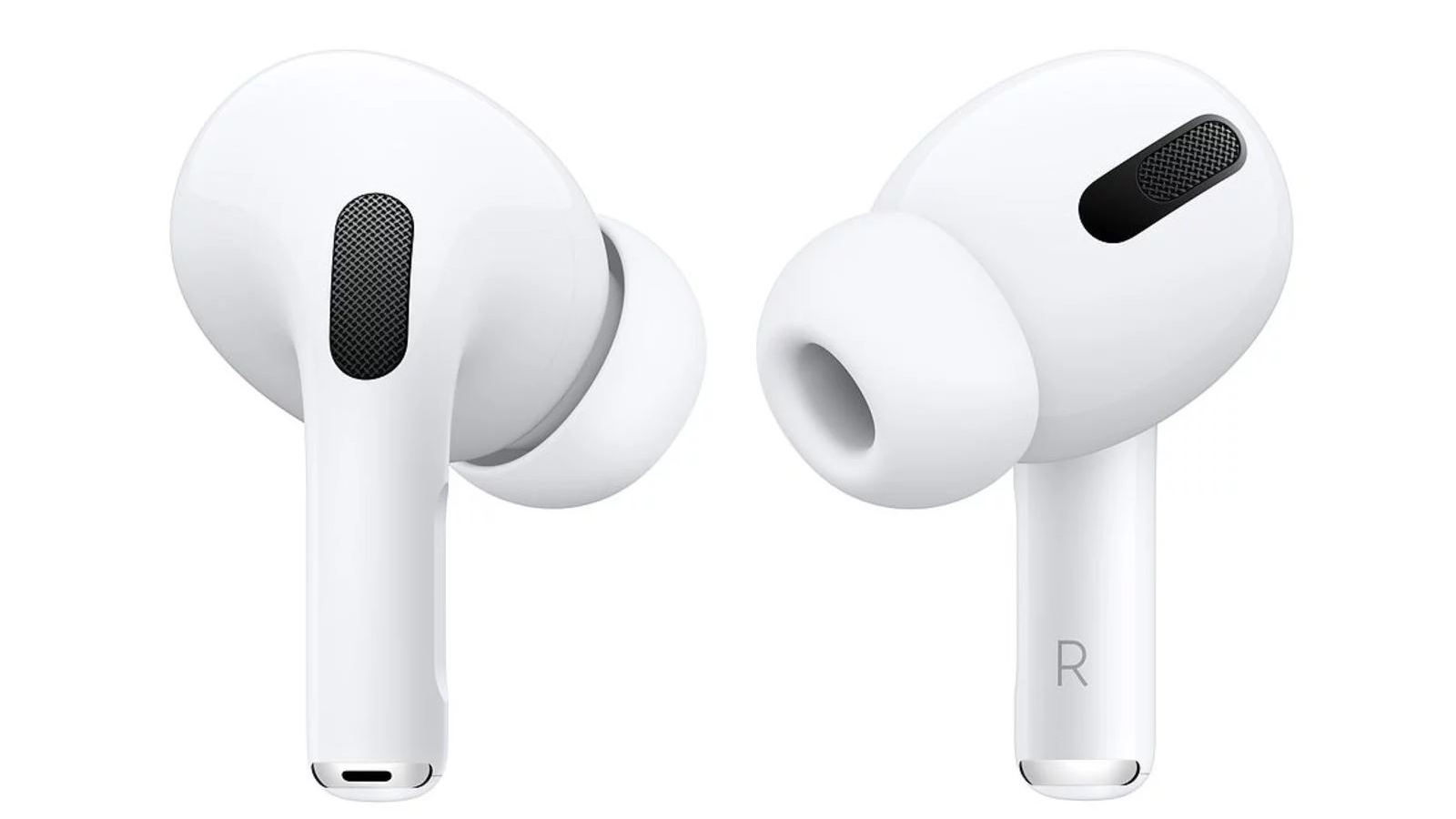Samsung Galaxy Buds Pro vs Apple AirPods Pro: the noise-cancelling earbuds compared
Samsung and Apple do battle once more

Sign up for breaking news, reviews, opinion, top tech deals, and more.
You are now subscribed
Your newsletter sign-up was successful
The Samsung Galaxy Buds Pro arrived in January 2021, following months of leaks and rumors – and with active noise cancellation and 3D audio support, they’re a serious rival for the Apple AirPods Pro.
In many ways, the Galaxy Buds Pro are AirPods Pro alternatives for Samsung users, with the Apple’s buds being heavily biased towards iOS devices – indeed, many of their best features are only available when the AirPods Pro are paired with other Apple devices, and it’s the same story with Samsung’s earbuds and its own range of Galaxy smartphones.
The Samsung Galaxy Buds Pro follow in the footsteps of the Galaxy Buds Plus and Galaxy Buds Live. However, these wireless earbuds were certainly not Samsung’s best, with the Galaxy Buds Pro representing a significant step up in terms of the specs.
Samsung’s strategy so far has been to release true wireless earbuds on a rather rapid schedule; the Galaxy Buds Pro were launched just six months after the Galaxy Buds Live. Since then, we've also had the Samsung Galaxy Buds 2, which feature a number of improvements over the Buds Pro, including overall better sound and slightly improved active noise cancellation, too. They're also a good deal cheaper than the Galaxy Buds Pro, which does make the Galaxy Buds 2 Samsung's best pair of earbuds yet.
That’s in stark contrast to Apple, which takes its sweet time with its audio releases. Has the extra time spent developing the AirPods Pro made them a superior pair of true wireless earbuds compared to the Galaxy Buds Pro?
Deciding between the Samsung Galaxy Buds Pro and the Apple AirPods Pro can be tricky, especially as they share similar specs. Having tested both models extensively, we’ve put together this handy guide to what you can expect from the Galaxy Buds Pro and the AirPods Pro, with a deep dive into their best (and their worst) features.

Samsung Galaxy Buds Pro
Reasons to buy
Reasons to avoid
Following multiple leaks, the Galaxy Buds Pro were announced on January 14, 2021 alongside the Samsung Galaxy S21 during the company’s Unpacked 2021 event.
Sign up for breaking news, reviews, opinion, top tech deals, and more.
A huge step up from the Samsung Galaxy Buds Live, the new Samsung Galaxy Buds Pro offer better sound and microphone quality with multipoint pairing and spatial audio support.
They don’t offer the same level of noise cancellation as over-ear headphones or the sound quality of high-end earbuds, but for their price they offer just enough of both to be competitive.
Competitive price
The Galaxy Buds Pro will set you back $199 / £219 / AU$349. That may sound pricey, but they’re cheaper than the Apple AirPods Pro, which cost $249 / £249 / AU$399 when they launched in 2019 – and while discounts are sometimes available, they’re rare.
Samsung’s Pro earbuds are a little more expensive than their predecessors, which makes sense when you consider the step up in specs. Saying that, if you’re looking for cheaper alternatives, you don’t have to look far: the Sony WF-SP800N and Jabra Elite 75t both offer active noise cancellation for lower prices, as long as you don’t mind skipping out on the Samsung-specific features.
Water-resistance
Up to this point, Samsung’s earbuds have only been IPX2 or IPX4 water-resistant. That meant that they were good for a few drops of rain or a bit of sweat, but they weren’t the kind of things you’d want to have around you during intense workouts.
With IPX7 certification, the Samsung Galaxy Buds Pro are protected against fresh water immersion for 30 minutes at a depth of up to one meter (though we wouldn’t recommend using them for swimming), which is a big improvement for Samsung, and rivals the highest standards of other earbuds.
Meanwhile, the AirPods Pro offer a rating of IPX4 – not bad by any means, but Samsung is the clear winner in this department.
Great Galaxy integration
The Galaxy Buds Pro come with lots of features that are tailored to the Samsung crowd, including multipoint pairing, hands-free Bixby support (but not Google Assistant) and the Samsung Galaxy Wearable app that’s only available on Android that you’ll need to use to unlock the Buds’ best features. They can also use Samsung’s proprietary Scalable Audio that supports UHQ audio streaming over Bluetooth at up to 24-bit / 96kHz, SmartThings Finder and multi-mic recording that allows you to use the Buds as a lapel mic stand-in when you shoot videos on your Samsung phone.
360 Audio
The Galaxy Buds Pro come with 360 Audio support, which Samsung says brings “theater-like, multichannel sound” to the buds, with the ability to upscale any audio source - no need to seek out tracks mixed in 5.1 or above.
Any downsides?
While noise cancellation is perhaps the biggest calling card of the Samsung Galaxy Buds Pro, we found that this feature was lacking compared to other ANC-enabled wireless earbuds. Saying that, the ANC is far better than what their predecessors could manage, and we found the Galaxy Buds Pro were able to drastically reduce the sounds of loud air purifiers and humidifiers. However, they didn’t stand a chance when someone else in the house was playing music.
The audio quality also leaves something to be desired, with a flat presentation and small soundstage – though we did find that they sounded balanced across the bass, mids, and trebles.
We also weren’t enamored by the fit of the earbuds, which we found to be bulky and too uncomfortable to wear in bed.
Finally – and this isn’t necessarily a downside for some – is the fact that the Samsung Galaxy Buds Pro are specifically designed to work with Galaxy devices. That means, if you have an iOS or non-galaxy Android device, you won’t have access to many of the features that sets these earbuds apart from the competition.
- Read our full Samsung Galaxy Buds Pro review

Apple AirPods Pro
Reasons to buy
Reasons to avoid
The Apple AirPods Pro are among the most popular true wireless earbuds you can buy today, following in the footsteps of the iconic AirPods.
With a great sound, strong noise cancellation, and excellent quality of life features for iOS users, these snug-fitting earbuds even scan your ears to ensure they’re fitted correctly.
While they aren’t the best true wireless earbuds on the planet – that honor goes to the Sony WF-1000XM4, the AirPods Pro come close, offering extras like Spatial Audio, Automatic Pairing, and the ability to track your hearing health.
Compact design
The AirPods Pro are far sleeker than their predecessors, the 2019 AirPods, with silicone eartips and built-in air vents that allow you to find a comfy and secure fit. Their lightweight build and compact accompanying charging case makes them ideal for use on the move, and we think they’re more comfortable than the Samsung Galaxy Buds Pro. However, their lower water-resistance rating means that Samsung’s buds may be more suitable for use while working out.
Hearing health tracking
The AirPods Pro – along with the AirPods and Powerbeats Pro – send exact volume levels to your iPhone, so you can make sure you’re not listening to music too loudly. According to Deafblind UK, experts recommend that you keep your listening to between 60 and 85 decibels to protect your hearing health, and with the AirPods Pro, you can do just that.
Great sound and noise cancellation
Compared to the Samsung Galaxy Buds Pro, the Apple AirPods Pro offer a higher standard of audio quality, as well as active noise cancellation. With a well balanced soundstage, smooth mids, and powerful bass frequencies, these buds perform best when it comes to pop, rock, and RnB, though they lack the sparkle to make classical music really shine.
They also come with Spatial Audio, which works in 5.1, 7.1 and Dolby Atmos, positioning sound all around you within a virtual sphere. That means that if you're watching a Dolby Atmos film that shows a plane flying overhead, it will sound as though the plane is really passing above you (well, sort of).
Easy pairing with iOS devices
One of the best things about the AirPods Pro (and the AirPods Max) is how well they integrate into Apple’s wider ecosystem, including how quickly and seamlessly they pair with iOS devices (though they do also work with Android devices).
A new feature, called auto-switching, is testament to that: following a recent software update, the AirPods Pro can now, in Apple's words, "magically switch over between devices", detecting automatically which iOS device you are using.
As well as that, you can use the recently announced Apple HomePod mini (and older Apple HomePod) to transmit voice messages to AirPods in your home, thanks to a new Intercom feature.
Spatial Audio
The AirPods Pro got an upgrade with iOS 14, which allowed for a feature called Spatial Audio.
Spatial Audio works in 5.1, 7.1, and Dolby Atmos, which positions sound all around you within a virtual sphere – that means that if you're watching a Dolby Atmos film that shows a plane flying overheard, it will sound as though the plane is really passing above you.
As well as allowing for clever virtual Dolby Atmos, the AirPods Pro can track the motion of your head and your device, to ensure that the audio always appear to originate from the correct position.
Any downsides?
The biggest issue with the Apple AirPods Pro is their price; at $249 / £249 / AU$399 they’re more expensive than many similar models on the market (though Apple is said to be working on a cheaper version, the so-called AirPods Pro 2).
Just as the Samsung Galaxy Buds are made to work with Galaxy devices, the AirPods Pro are geared towards iOS users, and that means many of their extra features won’t work with Android smartphones and tablets.
The design is also somewhat divisive. Many people dislike the look of the protruding ear stems, even if they aren’t as egregious as the 2019 AirPods – and you won’t find the AirPods Pro in any of the cool colors you get with Samsung’s earbuds.
- Read our full Apple AirPods Pro review
Takeaway
Whether you buy the Samsung Galaxy Buds Pro or the Apple AirPods Pro should really come down to what kind of smartphone or tablet you intend to use them with. If you’re buying the Samsung Galaxy S21, staying in the family is your best bet to get the most out of your earbuds.
Likewise, the AirPods Pro work best with Apple devices, and even integrate with the company’s HomePod and HomePod mini smart speakers.
If noise cancellation and sound quality are your biggest concerns, the AirPods Pro are probably your best bet too; though the high water-resistance rating provided by the Galaxy Buds Pro means they’re likely the better choice if you want to use your earbuds for working out.
Both buds support 3D audio in some shape or form, with head-tracking ensuring the sound will always originate from the right place in relation to your ears. Saying that, the Galaxy Buds Pro's 360 Audio can be used with any audio source, while the AirPods Pro can only utilize Spatial Audio for tracks in 5.1 and above.
Of course, you may decide that neither of these models are right for you – after all, there are better-sounding true wireless earbuds out there, like the Sony WF-1000XM4 and the Cambridge Audio Melomania 1 Plus, and we think Samsung's most recent buds, the Galaxy Buds 2, are better-sounding than the Pro.
Despite their relatively high prices, neither the Galaxy Buds Pro nor the AirPods Pro excel when it comes to battery life, offering up to 27 and 25 hours respectively. That’s fine, but certainly not class-leading.
If you’re on a strict budget, it’s well worth checking out some cheaper alternatives too; the Lypertek PurePlay Z3 2.0 sound great and boast an astonishingly long battery life for a low price.
- Looking for more? Check out the best wireless earbuds you can buy today

Olivia was previously TechRadar's Senior Editor - Home Entertainment, covering everything from headphones to TVs. Based in London, she's a popular music graduate who worked in the music industry before finding her calling in journalism. She's previously been interviewed on BBC Radio 5 Live on the subject of multi-room audio, chaired panel discussions on diversity in music festival lineups, and her bylines include T3, Stereoboard, What to Watch, Top Ten Reviews, Creative Bloq, and Croco Magazine. Olivia now has a career in PR.